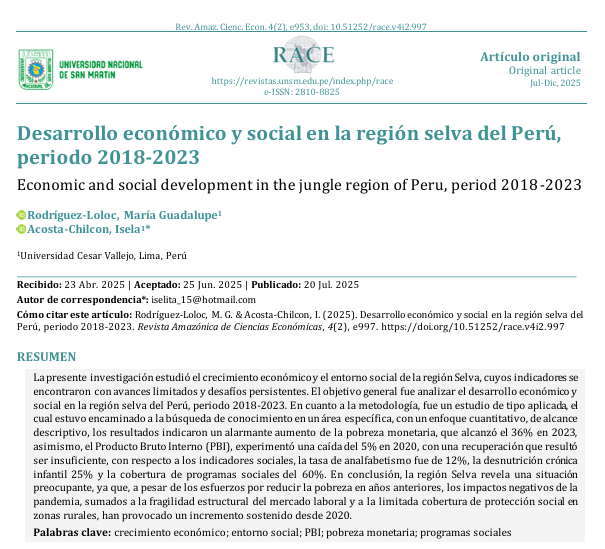Economic and social development in the jungle region of Peru, period 2018-2023
DOI:
https://doi.org/10.51252/race.v4i2.997Keywords:
economic growth, social environment, PIB, monetary poverty, social programsAbstract
The present research studied the economic growth and social environment of the Selva region, whose indicators were found to have limited progress and persistent challenges. The general objective was to analyze the economic and social development in the jungle region of Peru, period 2018-2023. Regarding the methodology, it was an applied type study, which was aimed at the search for knowledge in a specific area, with a quantitative approach, descriptive in scope, the results indicated an alarming increase in monetary poverty, which reached 36% in 2023, Likewise, the Gross Domestic Product (PIB), experienced a 5% drop in 2020, with a recovery that turned out to be insufficient, with respect to social indicators, the illiteracy rate was 12%, chronic child malnutrition 25% and the coverage of social programs 60%. In conclusion, the Selva region reveals a worrisome situation, since, despite efforts to reduce poverty in previous years, the negative impacts of the pandemic, coupled with the structural fragility of the labor market and the limited coverage of social protection in rural areas, have led to a sustained increase since 2020.
Downloads
References
Acosta, S. (2023). Los enfoques de investigación en las ciencias sociales. Revista Latinoamericana, 3(8), 82–95. https://doi.org/10.53595/rlo.v3.i8.084
Arias, J., & Covinos, M. (2021). Diseño y metodología de la investigación (1ª ed.). Enfoques Consulting. https://gc.scalahed.com/recursos/files/r161r/w26022w/Arias_S2.pdf
Armey, R., Hiocamotti, J., Reunel, C., Palacios-Ramos, S., & Linares-Palomino, R. (2024). Tree diversity in secondary forests of the montane and premontane strata in the province of Chanchamayo (Peru). Lilloa, 61(1), 47–64. https://doi.org/10.30550/j.lil/1882
Bedoya-Garland, E., Aramburú, C. E., & López, A. (2023). The production of new natures in the Peruvian Upper Amazon (1940–1981) and Ester Boserup's theses. Revista Kawsaypacha: Sociedad y Medio Ambiente, 1(12), 1–27. http://dx.doi.org/10.18800/kawsaypacha.202302.a008
Burbano, A., Paz, J., Solarte, A., Pradro, D., & Villareal, C. (2024). Paisajes culturales en la frontera colombiana, ecuatoriana, peruana. EducAcción Sentipensante, 4(2), 53–74. https://doi.org/10.22490/28057597.8167
Cruz, M., Morales, A., & Cortez, R. (2024). El necesario y urgente «golpe de timón» de la gestión pública en el Perú. Apuntes, 51, 1–29. http://dx.doi.org/10.21678/apuntes.96.1913
Deiglmeir, K., & Phills, J. (2020). Manual de Oslo: Guía para la recogida e interpretación de datos sobre innovación. OCDE. https://www.researchgate.net/profile/Jaime-Gonzalez-4/publication/347460775
Guerrero, V. (2022). Enfoque cuantitativo: Taxonomía desde el nivel de profundidad de la búsqueda del conocimiento. Llalliq, 2(1), 13. https://www.academia.edu/112337746
Gutiérrez, G. (2023). Retos del desarrollo sostenible: Estrategias efectivas para enfrentarlos y superarlos. Ecología Digital, 1(1), 1–5. https://ecologiadigital.bio/cuales-son-los-principales-retos-de-desarrollo-sostenible-y-como-abordarlos/
Huahua, I. (2020). La diplomacia cultural como política de inserción estratégica internacional del Perú: Análisis del periodo 2003–2018. Dspace, 1(1), 20–50. https://repositorio.iaen.edu.ec/xmlui/handle/24000/6130
Instituto Nacional de Estadística e Informática. (2022). Producto bruto interno creció a una tasa promedio anual de 3,7% durante el periodo 1950–2021. https://www.gob.pe/institucion/inei/noticias/611931
Instituto Nacional de Estadística e Informática. (2023). Magnitud y crecimiento poblacional. https://www.inei.gob.pe/estadisticas/indice-tematico/poblacion-y-vivienda/
Julca-Otiniano, A., Alvarado-Huamán, L., Borjas-Ventura, R., Castro-Cepero, V., León Rojas, F., Valderrama Palacios, D., & Bello, S. (2023). Coffee varieties (Coffea arabica), a review and some experiences in Perú. Revista de Investigación e Innovación Agropecuaria y de Recursos Naturales, 10(2), 1–22. https://doi.org/10.53287/ruyx4519vm15b
Lavado-Puente, C., Sánchez-Castro, A., Lavado-Meza, C., & Huaraca-García, A. (2024). Actitudes hacia la investigación en una filial universitaria de la Selva Central del Perú. Formación Universitaria, 17(6), 57–66. http://dx.doi.org/10.4067/s0718-50062024000600057
MIDIS. (2025). La propuesta del MIDIS para medir la pobreza multidimensional excluye algunas de las carencias más importantes para los peruanos. Apoyo Consultoría. https://www.apoyoconsultoria.com/es/la-propuesta-del-midis-para-medir-la-pobreza-multidimensional-excluye-algunas-de-las-carencias-mas-importantes-para-los-peruanos/
MINAGRI. (2022). Perú y Etiopía lideran producción mundial de café orgánico. Junta Nacional del Café. https://juntadelcafe.org.pe/peru-y-etiopia-lideran-produccion-mundial-de-cafe-organico/
MINCETUR. (2019). Reporte regional de turismo Amazonas (1ª ed.). Ministerio de Comercio Exterior y Turismo. https://cdn.www.gob.pe/uploads/document/file/436931
MINEDU. (2020). Ruralidad y educación en el Perú. Organización de las Naciones Unidas para la Educación, la Ciencia y la Cultura. https://unesdoc.unesco.org/in/documentViewer.xhtml?v=2.1.196&id=p::usmarcdef_0000374789
OCDE. (2018). Manual de Oslo: Guía para la recogida e interpretación de datos sobre innovación. https://www.conacyt.gov.py/sites/default/files/detiec/concurso/Manual_de_Oslo.pdf
ONU. (2022). El aumento de las temperaturas mundiales es alarmante. Organización de las Naciones Unidas. https://www.unep.org/es/noticias-y-reportajes/reportajes/el-aumento-de-las-temperaturas-mundiales-es-alarmante
Tapia, R., Cano, J., Quispe, R., & Cruz, K. (2024). El desarrollo sostenible y su implicancia en la Amazonía peruana: Una revisión sistemática. Aula Virtual, 15(2), 1–15. https://doi.org/10.5281/zenodo.11301897
Terrones, J. (2024). Las asociaciones público-privadas como propuesta de solución para la adecuada prestación de los servicios de agua potable y saneamiento en el Perú [Tesis de licenciatura, Pontificia Universidad Católica del Perú]. https://tesis.pucp.edu.pe/items/70c97327-34a5-4c0a-8fe1-e8c68b810389
Valdez-Arancibia, J., Veli-Chuquillanqui, R., & Cerron-Juzcamayta, R. (2023). Analysis of the sociocultural impact of tourism in central jungle of Peru. Revista Interamericana de Ambiente y Turismo, 19(2), 1–6. http://dx.doi.org/10.4067/S0718-235X2023000200143
Yvette, P. (2021). Perú alcanza cifra de deforestación más alta en los últimos 20 años. Latinoamérica. https://es.mongabay.com/2021/10/peru-aumenta-deforestacion-cifras-bosques/

Downloads
Published
How to Cite
Issue
Section
License
Copyright (c) 2025 María Guadalupe Rodríguez-Loloc, Isela Acosta-Chilcon

This work is licensed under a Creative Commons Attribution 4.0 International License.





